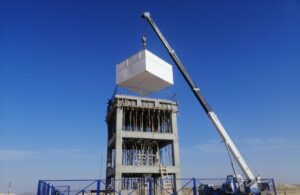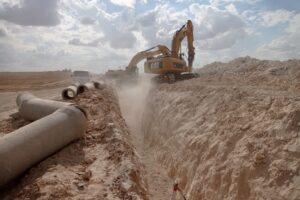The Syrian Civil War, now entering its twelfth year, has displaced millions of people, many of whom are now in displacement camps after fleeing their homes. The conflict has destroyed key infrastructure, leaving families without reliable access to water and sanitation services, even in camps.
Water scarcity is a recurring challenge and camp residents have relied on trucks to deliver drinking water every day for years. To address access issues in one northeast Syria camp, Blumont is constructing a water network connected to the nearby Nabaa Spring. The 5.7 km network—the first of its kind in a displacement camp in the region—will provide 600 families with access to clean drinking water and serve as a model for potential expansion in other communities. This direct access will save time, improve water quality, reduce water loss, and eliminate the need for water trucking services – a time-consuming and complex process.

The new water system includes an elevated water tank.
“The network will provide safe water access for thousands of people and limit the spread of water-borne diseases,” said Omar, a Blumont engineer managing the project. “I think nothing is more important. This system will provide permanent water solutions.”
Blumont is also constructing a 5.3 km sewage network to collect wastewater from 150 facilities in the camp. By routing waste to a large septic tank outside the camp, rather than in trenches or local tanks that can pose environmental hazards to residents, the network will help protect camp cleanliness and community health. This network is also the first of its kind in a displacement camp in the region.
“We are building this network as a humanitarian response to reduce risks to public health and to ensure all the right conditions that enable people to live in health, dignity, and comfort,” said Emad, a senior site engineer working on the projects.
The two networks were designed to meet community needs and built to withstand the realities of conditions and use in the camp—with the utility of the system engineered to last up to 25 years. Residents provided input on project development and are regularly updated on progress.

The sewage network will collect waste from 150 facilities in the camp.
Once construction and testing are complete, the families will be moved to the new compounds where they can begin using these new services. The new water and sewage networks are expected to benefit 3,600 people. After this pilot phase, Blumont will explore ways to expand these networks to other sections of the camp, in order to make it a better and more sustainable place to live.
“We are the first to build a compound that is fully equipped with this infrastructure to provide residents with an easier life. This is just the beginning,” said Omar.



